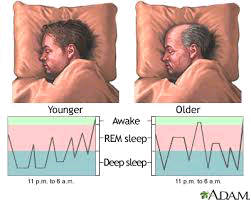AS you age your body produces lower levels of growth hormone, so you are most likely going to experience a decrease in slow wave or deep sleep. When this happens you produce less melatonin, meaning you will often experience more fragmented sleep (more rapid sleep cycles) and wake up more often during the night. As your circadian rhythm (the internal clock that tells you when to sleep and when to wake up) changes, you may also find yourself wanting to go to sleep earlier in the evening and waking up earlier in the morning.
As you age, you may have to spend longer in bed at night to get the hours of sleep you need, or you may have to make up the shortfall by taking a nap during the day. In most cases, such sleep changes are normal and don’t indicate a sleep problem.
At any age, it is common to experience occasional sleep problems. However, if you experience any of the following symptoms on a regular basis, you may be dealing with a sleep disorder:
• Have trouble falling asleep even though you feel tired
• Have trouble getting back to sleep when awakened
• Don’t feel refreshed after a night’s sleep
• Feel irritable or sleepy during the day
• Have difficulty staying awake when sitting still, watching television, or driving
• Have difficulty concentrating during the day
• Rely on sleeping pills or alcohol to fall asleep
• Have trouble controlling your emotions
Many cases of insomnia are caused by underlying but very treatable causes. While emotional issues such as stress, anxiety, and depression can cause insomnia, the most common causes in adults over 50 are a poor sleep environment and poor sleep and daytime habits. Try to identify all possible causes of your insomnia so you can tailor treatment accordingly.
• Are you under a lot of stress?
• Are you depressed? Do you feel emotionally flat or hopeless?
• Do you struggle with chronic feelings of anxiety or worry?
• Have you recently gone through a traumatic experience?
• Are you taking any medications that might be affecting your sleep?
• Do you have any health problems that may be interfering with sleep?
The most common causes of insomnia and sleep problems in older adults include:
• Poor sleep habits and sleep environment. These include irregular sleep hours, consumption of alcohol before bedtime, and falling asleep with the TV on.
• Pain or medical illness. Pain can keep you from sleeping well. In addition, many health conditions such as a frequent need to urinate, arthritis, asthma, diabetes, osteoporosis, nighttime heartburn, menopause, and Alzheimer’s can interfere with sleep.
• Medications. Older adults tend to take more medications than younger people and the combinations of drugs, as well as their side-effects, can impair sleep.
• Lack of exercise. If you are too sedentary, you may never feel sleepy or feel sleepy all of the time. Regular aerobic exercise during the day, at least three hours before bedtime, can promote good sleep.
• Psychological stress or psychological disorders. Significant life changes like the death of a loved one or moving from a family home can cause stress. Anxiety or sadness can also keep you awake, which can, in turn, cause more anxiety or depression.
• Sleep disorders. Restless Legs Syndrome (RLS) and sleep-disordered breathing—such as snoring and sleep apnea—occur more frequently in older adults.
• Learned response. People with a legitimate cause for having trouble sleeping—after suffering a loss, for example—may lie in bed and try to force themselves to sleep. Eventually their bodies learn not to sleep. Even after your original reason for sleep disruption has passed, the learned response can remain.
Staying healthy over 50: Tips for coping with change
As you age beyond 50, there will be periods of both joy and stress. It’s important to build your resilience and find healthy ways to cope with challenges. This ability will help you make the most of the good times and keep your perspective when times are tough.
• Focus on the things you are grateful for. The longer you live, the more you lose. But as you lose people and things, life becomes even more precious. When you stop taking things for granted, you appreciate and enjoy what you have even more.
• Acknowledge and express your feelings. You may have a hard time showing emotions, perhaps feeling that such a display is inappropriate and weak. But burying your feelings can lead to anger, resentment, and depression. Do not deny what you are going through. Find healthy ways to process your feelings, perhaps by talking with a close friend or writing in a journal.
• Accept the things you cannot change. Many things in life are beyond our control. Rather than stressing out over them, focus on the things you can control such as the way you choose to react to problems. Face your limitations with dignity and a healthy dose of humor.
• Look for the silver lining. As the saying goes, “What does not kill us makes us stronger.” When facing major challenges, try to look at them as opportunities for personal growth. If your own poor choices contributed to a stressful situation, reflect on them and learn from your mistakes.
• Take daily action to deal with life’s challenges. When a challenge seems too big to handle, sweeping it under the carpet often appears the easiest option. But ignoring the problem does not make it go away; it allows both the problem and your anxiety to build. Instead, take things one small step at a time. Even a small step can go a long way to boosting your confidence and reminding you that you are not powerless.


